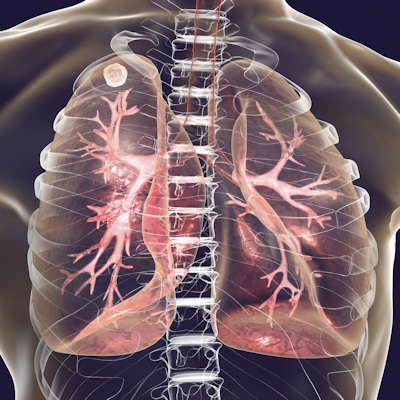March 24, 2023 -- Francis Crick Institute researchers have found that the body's natural process of removing old and damaged cell parts may be an essential part of tackling infections like tuberculosis (TB) that take hold within cells. They hypothesized that harnessing this process might present alternatives to antibiotics or improve antibiotic use. Their study was published in Nature Microbiology on Friday -- World TB Day.
TB is caused by bacteria (Mycobacterium tuberculosis) that most often affect the lungs. Untreated TB killed 1.6 million people in 2021. Although a long course of different antibiotic treatments is required to effectively remove the infection, TB is curable and preventable.
To combat infections like TB, the team studied genes key to bacteria's ability to evade autophagy, a pathway used by cells to destroy themselves when they are stressed or infected. They engineered human immune cells called macrophages from induced pluripotent stem cells, which have the ability to become any cell type in the body. They then used genome editing tools to manipulate the macrophages' ability to perform autophagy.
When genes key to autophagy were removed and the cells were infected with M. tuberculosis, the bacterial infection took hold, increasing replication within the engineered cells and causing mass host-cell death. The team validated their results using macrophages isolated from blood samples, confirming the importance of autophagy in human defenses.
The researchers believe that if autophagy's strong role in controlling intracellular infections like TB can be strengthened, it could provide new avenues for tackling antibiotic resistance. However, they note that boosting the autophagy pathway is complex, since all parts of the body use autophagy to recycle old and damaged cells. To safely increase autophagy where infections occur, researchers must target the pathway in macrophages alone. The team is now planning to screen for drug compounds that could boost autophagy in such a targeted way. Their goal is to make existing antibiotic drugs more effective, or present alternatives to antibiotic drugs in cases where bacteria have evolved resistance.
"Antibiotic resistance is a huge threat to our health so it's incredibly important to understand how our bodies fight infection and where there might be room for improvement," Beren Aylan, joint first author and a Crick PhD student, said in a statement. "Anything that can be done to more effectively remove bacteria could also make a huge difference to the cost and accessibility of treatments."
Copyright © 2023 scienceboard.net









